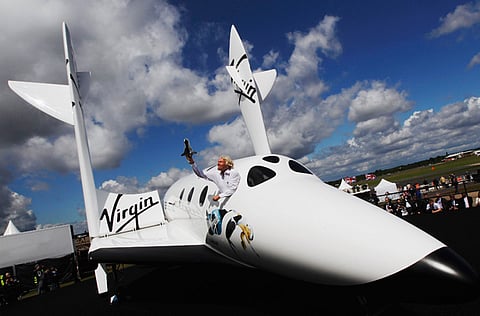Abu Dhabi aims to become a regional hub for space trips
UAE capital sees space programme as a key new sector for the country

Abu Dhabi: The UAE is in talks with Virgin Galactic to start commercial space flights in 2013 with Abu Dhabi as a regional hub for the 21st Century spaceport, said Frank Rose, deputy assistant secretary (Space and Defense Affairs) at the US Department of State.
“The presence of a spaceport in the UAE will enhance tourism and foreign investment in the region,” said Rose, adding that “the new space economy will boost diversification of the economy for long-term prosperity.”
He added that Abu Dhabi is poised to make huge yields from the location of the company’s second spaceport in the capital of the UAE.
Rose, who is taking part in the two-day Global Space and Satellite Forum, the region’s premier space and satellite industry event, which is held in Abu Dhabi with the attendance of more than 400 experts, said that Abu Dhabi has the potentials to be a global and regional centre for the new commercial space industry and that commercial space has a large variety of applications that would help provide many job openings for high skilled personnel.
Rose added that satellites help boost economic growth, enhance space programmes, increase national security, improve businesses, and provide efficient services.
Yet, he pointed out that there are many challenges ahead for all countries with space activities
“First, there is space operation, the launching, and the complicating satellite traffic congestion in the orbit as there are more than 1,100 active satellites. There is a need for addressing these issues to avoid collisions.”
Mohammad Al Ahbabi, CIO and ICT advisor at the Centre of Excellence at the UAE Armed Forces, said that there are currently 60 countries in the world with space activities.
“The global space market is $300 billion and has been witnessing steady growth. It has grown 12 per cent since 2011,” said Al Ahbabi.
He added that the Middle East and North Africa (Mena) region has a high interest in space programmes.
“The UAE believes that space programme is a key sector for national interest and security and for diversifying its economy. We have Yahsat for military and commercial services. Also, we have other services applications for broadband and internet services,” said Al Ahbabi.
Prince Turki Al Saud, vice president of King Abdul Aziz City for Science and Technolgy, told Gulf News that satellite activities depend on knowledge and technology.
“We in the GCC and particularly in the UAE and Saudi Arabia are moving ahead towards decreasing our dependence on oil which has helped us transform our countries in many ways. These huge developments are mainly in real estate and infrastructure and human capital will qualify us to cater to the new technologies of space,” explained Prince Al Saud.
Golden years ahead for Thuraya and Yahsat
Stephen O’neil, president of Boeing Satellite, said that the coming 5-10 years will witness a boom in satellite business.
“Last Sunday we were talking about Thuraya and Yahsat. The coming five to ten years will be significant for Thuraya. The same applies to Yahsat. They will be more powerful for people and organisations as they will bring them closer to each other.
Sami Boustani, chief strategy officer at Yahsat, said that Yahsat is at the core of collaboration between the government and private sector.
“We are looking for sustainable business and growth. Mubadala has already invested in these satellites to extend services, which include services for the UAE Armed Forces.”
The UAE is fast becoming a major aerospace hub boosted by investment in technology, expertise and facilities.
Salem Al Marri, assistant director general of Emirates Institution for Advanced Science and Technology (EIASAT), told Gulf News that
“Dubai Sat 1 was launched in 2009 and Dubai Sat 2 will be launched before the end of 2013 from Russia,” said Al Marri, adding that both satellites are Korean made.
“Dubai Sat 3 is expected to be shipped within two years from now to the UAE and applications will be added to it before launching it either in 2016 or 2017. EIAST is aiming to enhance the position of the UAE in the scientific and technology arena” said Al Marri.
Sign up for the Daily Briefing
Get the latest news and updates straight to your inbox



